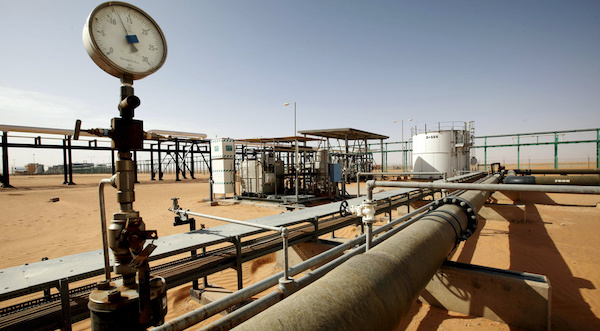
A general view of the El Sharara oilfield, Libya (By Reuters)
Libyaís national oil company says the United Arab Emirates (UAE) has been behind a decision by eastern-based rebel forces to hinder its latest efforts to resume crude exports for the first time in six months and re-impose a blockade on the countryís oil industry.
Libyaís Tripoli-based National Oil Corporation (NOC) said in a statement on Sunday that oil exports had resumed on July 10 following negotiations with the rebel forces led by renegade general Khalifa Haftar.
The blockade, however, returned in place only a day later as Haftarís forces stepped back from the negotiations, added the NOC.
"NOC has been informed that the instructions to shut down production were given to (Haftar-led rebes) by the United Arab Emirates," it said in a statement on Sunday, resuming "force majeure on all oil exports."
"This is gravely disappointing, especially following repeated statements by very senior representatives of the UAE last week in support of international efforts to restart oil production in Libya," it added.
The NOC is the only Libyan firm that can produce and sell oil under UN-endorsed agreements, which stipulate that revenues from the sales must flow into the Central Bank of Libya in Tripoli.
Following an agreement between Haftarís forces and the internationally-recognized government in Tripoli, the oil company announced on Friday it had lifted the force majeure resumed crude exports from all its key terminals.
Later in the day, the Vitol tanker Kriti Bastion docked and loaded at Es Sider port before sailing on Saturday, the first legal export of Libyan oil since the blockade was imposed.
But the rebel forces said Saturday that the blockade would remain in place until the rebelsí demands are met on the distribution of the countryís oil income.
Haftarís forces say proceeds from oil sales should be fairly distributed among all Libyan regions and not fund the sectors of the Tripoli government.
Ahmad al-Mismari, a spokesman for Haftarís militia, also called for the opening of a bank account in a "foreign country" for the distribution of oil revenue.
Libya - which sits atop the largest oil reserves in Africa - has been forced to stop oil production since the rebel forces took control of the export terminals and fields in the east in January and launched a push to squeeze resources of the Tripoli government.
The blockade has cost Libya 6.5 billion dollars in lost revenue, according to NOC.
The NOC further said the states responsible for this blockade should be held to account by the United Nations Security Council.
Haftarís forces began an offensive in April 2019 in an attempt to seize Tripoli and unseat the government.
The Libyan government, however, launched a counter-offensive backed by Turkey and has so far managed to retake most of the areas seized by Haftarís forces.
The rebels have the support by Saudi Arabia, the UAE, Egypt, and Russia, among others.
The North African country first plunged into chaos in 2011 when a popular uprising backed by a NATO intervention led to the ouster of long-time dictator Muammar Gaddafi.
SOURCE: PRESS TV
LINK: https://www.ansarpress.com/english/19278
TAGS:






























 online news tv
online news tv




